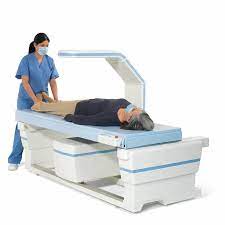In today’s world, advanced medical imaging techniques are pivotal in diagnosing and monitoring a variety of health conditions. Among these, Dexa scans and CT scans stand out for their specific applications and precision. This article delves into what these scans entail, their purposes, and how you can find the right services near you.
Understanding Dexa Scans
What is a Dexa Scan?
A Dexa (Dual-Energy X-ray Absorptiometry) scan is a medical imaging test primarily used to measure bone mineral density (BMD). By assessing BMD, this scan helps in diagnosing bone-related conditions such as osteoporosis, a condition where bones become brittle and more prone to fractures.
How Does a Dexa Scan Work?
During a Dexa scan, two low-dose X-ray beams with differing energy levels are directed at the bones being examined. The scan measures the amount of X-ray that passes through the bone, helping to calculate the density of the bone. This non-invasive procedure is quick, usually taking around 10-30 minutes, and involves minimal radiation exposure.
Why is a Dexa Scan Important?
-
Diagnosis of Osteoporosis: Dexa scans are crucial for diagnosing osteoporosis and other bone disorders. Early detection can lead to timely treatment, which can prevent fractures and other serious complications.
-
Fracture Risk Assessment: For individuals with conditions that affect bone density or those at higher risk of fractures, a Dexa scan can help assess fracture risk and guide treatment decisions.
-
Monitoring Bone Health: For individuals undergoing treatment for osteoporosis or other bone diseases, regular Dexa scans help monitor the effectiveness of the treatment and track changes in bone density.
Preparing for a Dexa Scan
Preparing for a Dexa scan is relatively simple. Patients are typically advised to avoid taking calcium supplements 24 hours before the scan and to wear loose, comfortable clothing without metal zippers or buttons.
Exploring CT Scans
What is a CT Scan?
A CT (Computed Tomography) scan is a sophisticated imaging technique that combines X-ray images taken from different angles to create detailed cross-sectional images of the body. Unlike a traditional X-ray, a CT scan provides a more comprehensive view of internal structures, including organs, bones, and tissues.
How Does a CT Scan Work?
During a CT scan, the patient lies on a table that slides into a large, doughnut-shaped machine. The machine rotates around the patient, taking multiple X-ray images from various angles. These images are then processed by a computer to produce detailed cross-sectional images, or slices, of the body.
Why is a CT Scan Important?
-
Diagnosis and Monitoring: CT scans are valuable for diagnosing various conditions, including cancers, internal injuries, and infections. They are also used to monitor the progress of certain diseases and evaluate the effectiveness of treatments.
-
Guiding Treatment: In some cases, CT scans are used to guide medical procedures such as biopsies or surgeries. They provide detailed images that help doctors plan and perform these procedures accurately.
-
Emergency Situations: CT scans are often used in emergency situations to quickly assess and diagnose injuries or conditions, such as internal bleeding or traumatic injuries.
Preparing for a CT Scan
Preparation for a CT scan depends on the type of scan being performed. In general, patients may be asked to fast for a few hours before the scan, especially if a contrast dye is used. It’s essential to inform the medical team about any allergies, kidney problems, or other health issues before undergoing a CT scan.
Finding Dexa Scans and CT Scans Near You
Finding Dexa Scan Services
To find a facility that offers Dexa scans near you, consider the following options:
-
Local Hospitals and Clinics: Many hospitals and medical centers offer Dexa scanning services. Check with your local hospitals or clinics to see if they have this imaging technology available.
-
Specialized Imaging Centers: Some imaging centers specialize in bone density testing and may offer advanced Dexa scanning services. Search online for “Dexa scan services near me” to find specialized centers in your area.
-
Referrals from Healthcare Providers: Your primary care physician or specialist can provide referrals to facilities that offer Dexa scans. They can also guide you in choosing the best provider based on your specific needs.
Finding CT Scan Services
To locate CT scans near me, consider the following resources:
-
Hospitals and Emergency Rooms: Most hospitals and emergency rooms are equipped with CT scanners. If you need an urgent CT scan, these facilities are often the first option.
-
Diagnostic Imaging Centers: Many diagnostic imaging centers provide CT scanning services. Search online or consult your healthcare provider for recommendations.
-
Medical Referrals: Your healthcare provider can refer you to reputable imaging centers that offer CT scans. They can also help coordinate the scan based on your medical needs.
Conclusion
Both Dexa scans and CT scans play crucial roles in modern medical diagnostics. While Dexa scans are essential for evaluating bone health and diagnosing conditions like osteoporosis, CT scans provide detailed images for a wide range of diagnostic and monitoring purposes. By understanding these imaging techniques and knowing how to find the right services near you, you can ensure timely and accurate medical evaluations.
Whether you’re seeking a Dexa scan to assess your bone density or a CT scan for a comprehensive look at your internal structures, leveraging local resources and medical referrals will help you find the best imaging services to meet your needs.
